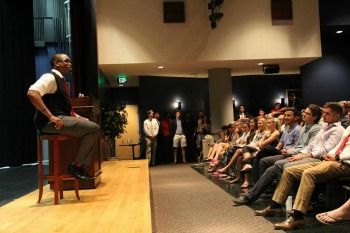
As Vice President of Health and Safety for Epsilon Zeta Chapter at the University of Tampa, Cameron McCabe (2016) wanted to host an event that not only benefitted his brothers at Theta Chi, but the University of Tampa campus as a whole. With finals coming up, McCabe knew that it would be a stressful time of year for the students and that some would be dealing with anxiety, depression, and even suicidal thoughts. He decided to make our Sacred Purpose a reality and approached his brothers with the idea of hosting a suicide awareness event.
McCabe’s idea was accepted and soon the brothers began selling “End the Silence” wristbands across campus to get their message out about the event. Proceeds from the wristband sales were donated to the American Foundation for Suicide Prevention.

For their event, the chapter decided to partner with Active Minds. Active Minds is a leading nonprofit organization that empowers students to speak openly about mental health issues in order to educate others and to encourage help-seeking. Active Minds is changing the culture on college campuses and in communities by developing and supporting student-run mental health awareness, education and advocacy groups on campuses nationwide. The nonprofit encourages students to seek help when it is needed, and serves as a liaison between students and the mental health community. Active Minds also aims to remove the stigma that surrounds mental health issues, and create a comfortable environment for an open conversation about mental health issues.
Epsilon Zeta Chapter asked nationally recognized mental health advocate, Jordan Burnham, to speak at their event. On April 1, Burnham told his incredible story of survival to a standing room only crowd at Reeves Theater on the University of Tampa Campus.
At the age of 18, and suffering from depression, Jordan Burnham tried to commit suicide by jumping out his ninth-story bedroom window. He survived – breaking his tibia, fibula and femur. His jaw was also broken in four places, his wrist, and he was bleeding internally – including from his brain.

As he spoke to the students, Burnham emphasized that seeking help is not a sign of weakness, but often leads to a successful recovery. He also shared his ongoing physical and mental health recovery process, and what students can do to create healthier and more supportive communities. Throughout the evening, Burnham was able to lighten the mood by cracking jokes and making students laugh, but his strong message was not to be taken lightly.
A question and answer session followed, and students opened up to Burnham – telling their own stories and asking for personal advice. Some commented about how they were able to relate. Others spoke of how Burnham’s message hit home.
“I just wanted everyone to know that there is always someone to talk to and an extended hand for help,” said McCabe. “My brothers at Epsilon Zeta and I plan to continue our efforts on campus, and in the community, to ‘End the Silence.’”





